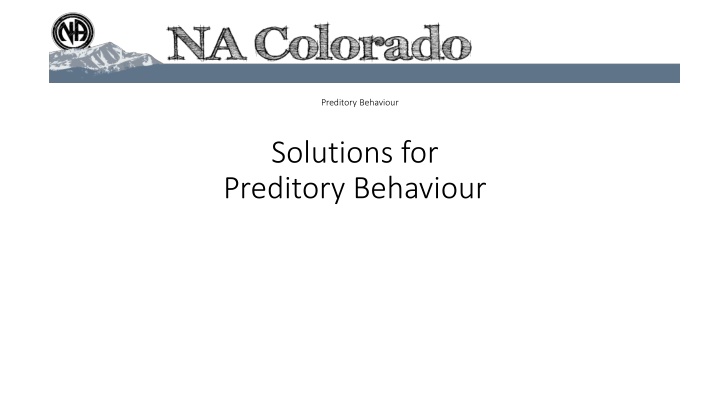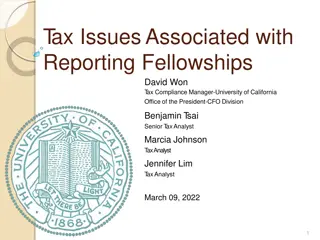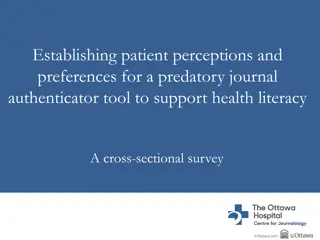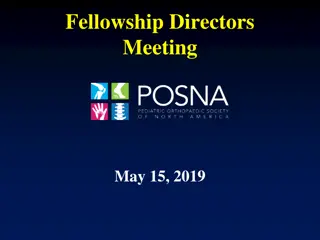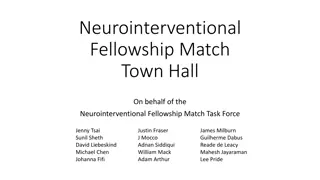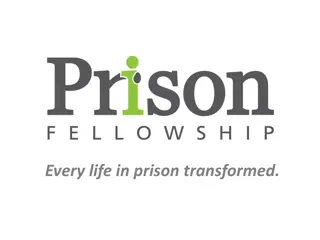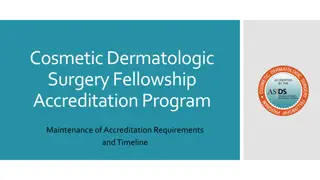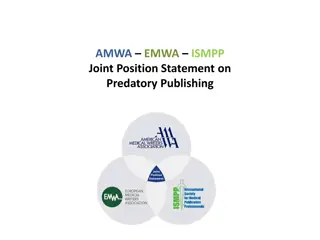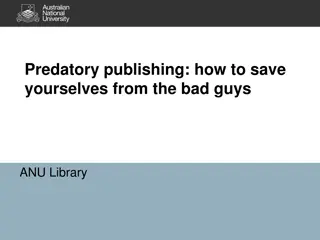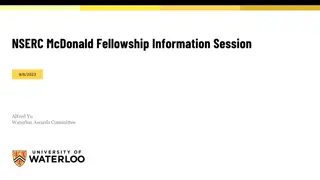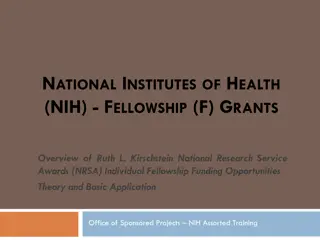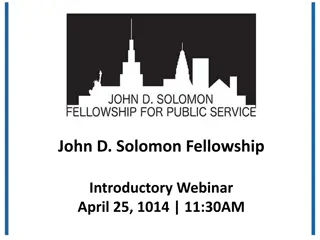Addressing Predatory Behavior in the Fellowship
Predatory behavior, especially towards vulnerable members, is a concerning issue in the fellowship. This behavior includes unwelcome advances, exploitation of power dynamics, and institutional sexism. The discussion on predatory behavior necessitates honest dialogue and a united approach for a safer recovery environment. Historical context reveals the prevalence of such behavior, emphasizing the need for accountability and responsibility within the fellowship to address and prevent further harm.
Download Presentation

Please find below an Image/Link to download the presentation.
The content on the website is provided AS IS for your information and personal use only. It may not be sold, licensed, or shared on other websites without obtaining consent from the author.If you encounter any issues during the download, it is possible that the publisher has removed the file from their server.
You are allowed to download the files provided on this website for personal or commercial use, subject to the condition that they are used lawfully. All files are the property of their respective owners.
The content on the website is provided AS IS for your information and personal use only. It may not be sold, licensed, or shared on other websites without obtaining consent from the author.
E N D
Presentation Transcript
Preditory Behaviour Solutions for Preditory Behaviour
Cc What is Predatory Behavior: address predatory behavior in the fellowship. In meetings, one of the most common ways this occurs is unwelcome sexual and romantic advances towards members, especially newcomers. Many recovering addicts around the world have been thinking about the best way to While the vast majority of NA members do not engage in this kind of behavior, the unfortunate reality is that too many of us, Especially our most vulnerable, have experienced it in various forms.
What is Predatory Behavior? fellowship depends upon our collective willingness to engage in honest dialogue about difficult topics that affect our most vulnerable members. This pamphlet addresses predatory behavior in the fellowship from multiple perspectives, drawing directly from the experience of our members. What follows is a solution-oriented discussion, reflection, and list of suggestions for moving forward in a spirit of unity. Some may perceive the discussion of this topic as controversial and divisive, but the future of our We want our place of recovery to be a safe place... Basic Text, What is the Narcotics Anonymous Program?
Historical Context The problem at hand is a real part of our history. Though predatory behavior is not exclusive to our fellowship, it may be exacerbated in the recovery community. Most of us have heard the term 13th Step used to describe a situation in which a member with more clean time takes advantage of a member in early recovery. This is a form of exploitation that deprives the newcomer of an opportunity to recover. It is predatory by nature because one person has more power than the other.
What is Predatory Behavior Understanding predatory behavior requires one to look beyond individual acts of misconduct and towards the institutional nature of sexism and the ways it has granted dominance to men over the course of history. While it s true that men experience sexual misconduct too, the vast majority of cases involve women. This is no less true in Narcotics Anonymous. These issues have always been prevalent in NA; partly because we are a fellowship of men and women who do not exist in a social vacuum. In other words, the problems in Narcotics Anonymous are often a reflection of the problems in society Mostly we know when we are doing something wrong, taking advantage of someone who is vulnerable, being controlling, deceptive, or abusive and we have a responsibility to ourselves as well as to the other person to stop it. Living Clean: The Journey Continues, Relationships
Moving Forward The Safety Statement is a small, but important step forward. It represents a shift towards accountability and responsibility that begins with the group, which is the most powerful vehicle for carrying the message. As we move forward by shedding light on predatory behavior in the fellowship, there are sure to be difficult discussions ahead. This is unchartered territory full of unanswered questions and we must navigate it together. This is how we grow as a fellowship. One important area of uncertainty is how we handle reports of harassment, abuse, or threatening behavior. Our collective experience is usually sufficient for dealing with the issues in our groups, but we are not professionals. There may be times when we should suggest that a fellow member seek outside help from a mental health professional or, in extreme cases, law enforcement.
Narcotics Anonymous doesnt enforce rules or regulate behavior, but a safe atmosphere is integral to fulfilling our primary purpose of carrying the message. If any member is harassed, threatened, or abused, our primary purpose is in jeopardy. When someone feels physically or emotionally unsafe due to the behavior of another NA member, they may be unable or unwilling to remain in the meeting or come back again. This situation prevents the member from hearing the message, participating in their recovery, and benefiting from the program and fellowship. Predatory behavior threatens the livelihood of the individual addict and the fellowship as a whole. In Narcotics Anonymous, we are concerned with protecting ourselves from ourselves. Basic Text, Tradition Two
Safety Statements One practical step that groups might take to address predatory behavior is by implementing a Safety Statement (see below) into their format. This can be integrated into the opening reports of trusted servants or included as a separate reading. The Safety Statement below is adapted from Informational Pamphlet #29: An Introduction to NA Meetings. Safety Statement We strongly discourage any harassment, threats, or disturbing behavior before, during, and after our meetings. This includes unwelcome sexual and romantic advances towards members, especially newcomers. Our meetings are for sharing NA recovery. It is the responsibility of all group members to help maintain an atmosphere in which every addict is safe to recover. If you feel harassed or threatened, share your concerns with the meeting leader or a trusted servant. Adapted from IP #29: An Introduction to NA Meetings
The statement above is not fellowship-approved literature and material from this pamphlet is not intended to be read at a meeting. However, if a meeting decides, through group conscience, that the statement doesn t conflict with the traditions and doesn t affect other groups or NA as a whole, then group autonomy enables them to include it in their format. The Safety Statement has been adapted from IP #29 to be more suitable for the group setting. If groups are considering the inclusion of the Safety Statement in their meeting format, they can assure members it is closely derived from 4 IP #29, which is fellowship-approved literature. Most importantly, the Safety Statement embodies the spiritual principles that are needed to cultivate an atmosphere of recovery for all our members. An atmosphere of recovery in our groups is one of our most valued assets, and we must guard it carefully... Basic Text, Tradition Two
"In active addiction, we worked hard to reach goals that left us feeling empty, lost, and dead inside. We got what we needed, no matter the cost to ourselves or those around us. As obsession and compulsion drove us to bitter ends, we surprised ourselves at what we would do, or what we would sacrifice. The more we pursued our goals, the less we felt any sense of purpose at all. Guiding Principles: The Spirit of Our Traditions, "Tradition Five "11. What is an atmosphere of recovery? As a member of an NA group, what am I doing to create and sustain an atmosphere of recovery?" "12. What do I recognize as exploitative behavior? What is my part in our shared responsibility to keep NA a safe place for all? Guiding Principles: The Spirit of Our Traditions, "Tradition Five "For Members "QUESTIONS FOR MEMBERS"
What follows are a preliminary list of questions that will likely surface as we begin to reflect on the best ways to move forward. These questions may serve as a starting point for discussions at business meetings or annual group inventories. What should a meeting leader or trusted servant do when a member reports an incident involving predatory behavior? Are we equipped to handle such reports? If not, how can we train trusted servants to deal with these issues? When should members intervene in predatory behavior? What is the best way to approach or confront a member who is engaging in predatory behavior? What kinds of incidents fall under the realm of outside issues ? When should we suggest that members seek outside help? What protections are in place for minors and young addicts who attend our meetings? How can we assure parents of young addicts that their children are safe in our meetings? How do our home groups take an inventory of these issues on an annual or semi-annual basis?
These questions represent the beginning of a necessary and fundamental healing process that should take place among reflective NA members around the world. Rather than problems, these questions present us with opportunities for spiritual growth. When we come together in a spirit of unity, nothing is too great a challenge. Our resourcefulness, experience, strength, and hope always prevail when our minds and hearts are open to God s will for us and the power to carry it out.
Spirituality in Action There is a growing number of us, men and women, who want to make a difference and become part of the solution. It s especially important, now more than ever, for us to organize by holding learning days, workshops, speaker jams, conventions, conferences, and other forums that feature speakers and topics that address predatory behavior in the fellowship. We should make an effort to seek out those individuals, groups, areas, and regions who have already been working diligently to make progress. Discussing this topic openly doesn t cast Narcotics Anonymous in a negative light, but instead demonstrates our honesty, courage, and willingness to apply spiritual principles to a problem that has been affecting NA members for too long. As we look toward the future, we should always be concerned with the safety, protection, and recovery of all our members, especially newcomers, young people, and other vulnerable addicts. We are not defined by how we treat our most experienced members, but by the actions we take to ensure the recovery of the addicts who need us most. Breaking the silence on this topic is a spiritual act of love, faith, and courage that has the power to help our fellowship right now and in the future.
